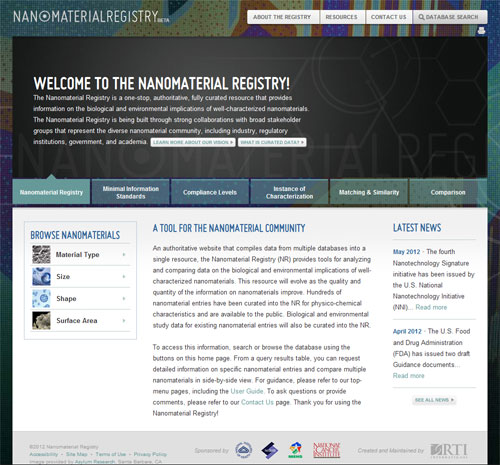RESEARCH TRIANGLE PARK, N.C. — RTI International recently launched the Nanomaterial Registry, an authoritative, web-based resource that organizes and evaluates the biological and environmental implications of well-characterized nanomaterials from publically available resources.
Available at www.nanomaterialregistry.org, the registry allows users to search, browse, and compare data on the characteristics of a wide variety of nanomaterials.

Available free to the public, the registry is intended to serve as a comprehensive resource for the nanomaterial community, providing data that has been systematically curated based on minimal information standards built with broad community acceptance.

Sponsored by the National Institutes of Health, the registry is designed to improve the quality of and standardization of available methods regarding nanomaterials. This resource will also help researchers create new models, standards and manufacturing methods for nanomaterials and accelerate the development and evaluation of nanomaterials for biomedical and environmental applications.
"The web-based nanomaterial registry provides the nanotechnology community with the ability to efficiently search, query and report data, including links to associated publications, modeling tools, computational results and manufacturing guidances," said Dr. William Heetderks, associate director of Extramural Programs at the National Institute of Biomedical Imaging and Bioengineering. "The registry facilitates data validation and data quality improvement and has the potential to accelerate the translation of new nanomaterials for biomedical and environmental applications."
To construct the registry, project team members developed minimal information standards for nanomaterial characterization, which were used to establish evaluation criteria for all information included in the registry. Data in the registry has been gathered from a selection of existing online databases; new information sources will be added as they are identified and validated.
The registry will also engage scientists in the nanomaterial community to contribute technical perspectives and data, promote common standards, and identify reliable information that can be used in regulatory decision making.
This project has been funded in whole, in the amount of $2,899,367, with federal funds from the National Institute of Biomedical Imaging and Bioengineering (NIBIB), and the following partners: the National Institute of Environmental and Health Sciences (NIEHS), and the National Cancer Institute (NCI), National Institutes of Health, Department of Health and Human Services, under contract No. HHSN268201000022C.
Source: RTI International
